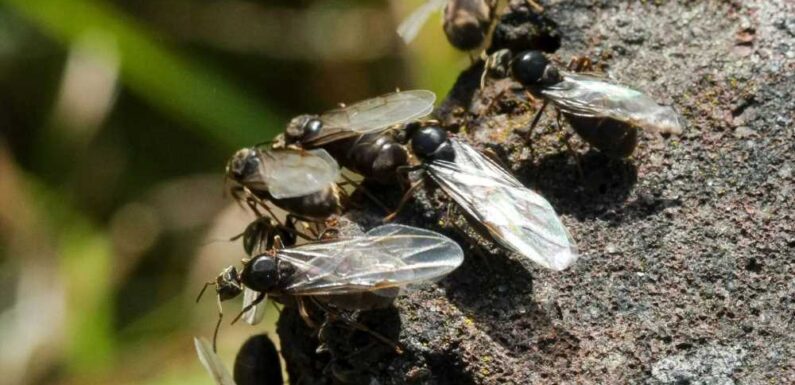
AS the UK’s muggy summer is in full swing, you may have noticed the return of a pesky airborne creature: the flying ant.
The phenomenon of Flying Ant Day – when the pests swarm the UK – typically happens in July every year but is assumedly delayed this year due to the rainy weather last month.
Swarms plagued the UK last night – including the the family-favourite seaside town, Brighton.
Flying Ant Day coincides with a period of hot and humid weather, which is when the queen ants and males tend to leave the nest.
If you’re feeling like a prisoner in your own home due to the winged pests, there are things you can do to get rid of them.
Safestyle Marketing Director Adam Pawson has shared some simple but effective tips with Fabulous.
read more on home advice
How to paint a wall like a DIY pro
My no-fuss simmer pot is just 4 ingredients and will make your home smell fresh
What are flying ants?
The most common type of flying ant is the black garden variety (the Lasius niger), whose nests have a single queen and anything from 5,000 to 15,000 workers.
Worker ants are ones you see during most of the year, collecting food.
But while workers, who are all female, live for around a month, queens can live for over ten years.
They spend most of their lives in their nest – only leaving for the "nuptial flight" as immature queens to mate and ultimately found their own colony.
After mating, the queens lose their wings – and those pesky larger ants you see walking around alone are in fact new queens hunting for somewhere to set up their nest.
Flying ants are mostly harmless to humans, but they do have a strange effect on seagulls who can appear drunk after eating a few due to formic acid they expel.
Batten down the hatches
Flying ants tend to stay outside and if they do find their way into your home, it’s usually an accident.
“Unfortunately, windows provide easy access for pesky flying ants to enter our properties, so it’s important to make sure any entry points are sealed shut,” Adam said.
“If any flying ants or insects have entered your home, make sure to frequently dust and clean any particularly light and airy spaces to ensure no insects or bugs get a chance to set up camp.”
Get citrussy
Diffusing essential oils – such as peppermint oil – can deter flying ants.
Most read in Fabulous
Meghan's birthday IGNORED publicly by Royals as they’re ‘fed up’ with Sussexes
Cash and love prizes are on your horizon, gold stars are the symbol of both
Harry & Meghan SNUBBED from royal gathering to mark 1 year since Queen's death
I spent nearly £3k on a supermarket food haul and – I only go once a year
Adam also recommended making a homemade citrus remedy with leftover fruit.
“Flying ants despise scents of citrus fruits, so mixing your leftover lemon, lime or orange peel with water can create an excellent rub to spread over your windowsill,” he said.
“You can also find citrus scented diffusers to place on your windowsill, the smell should act as a great repellent.”
Sticky traps
You may have used them to catch flies – but you can also use them to catch flying ants.
“Sticky fly traps are an effective way to catch flies, but they also double up and work to prevent flying ants from entering your living space too,” Adam said.
“However, it’s important to remove them from your windows carefully as they can leave a sticky residue that is hard to clean off, making it easy to scratch your window glass.”
The expert recommended trying scent deterrents before getting sticky to protect your windows.
“If you do use fly traps on your windows, place them at the bottom or top corner of your window and make sure to clean the affected area carefully afterwards,” he added.
“A solution of vinegar, washing up liquid and warm water will help to dissolve the mark, while being a safe option for your window.”
Be a clean queen
Adam admitted his final tip “may seem like common sense”, but he urged people in areas affected by flying ant swarms to stay on top of cleaning – particularly in the kitchen.
“Avoid leaving food leftovers out, particularly near any windows in your kitchen,” he said.
Read More on The Sun
Netflix users just realising hidden button unlocks free perks – how to find it
Mum gets the last laugh after grumpy plane passenger refused to switch seats
“Simply grab a damp cloth and some everyday cleaner to wipe over the surfaces, making sure to remove crumbs and dirty dishes.
“This regular maintenance will help to prevent swarms of flying ants entering your home.”
Source: Read Full Article








